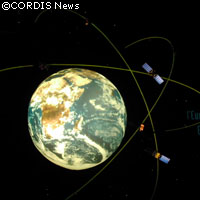Public sector to finance building of Galileo
The European Commissioner for Transport, Jacques Barrot, has said that the Commission will not give up on the Galileo project, which aims to provide Europe with a satellite radio navigation system to rival those of the US, China and Russia. The Commission has published a roadmap, outlining how the public sector will take full responsibility for the funding and piloting of the system's initial architecture. Galileo is a joint European Commission-European Space Agency (ESA) initiative, and was to be financed through a public-private partnership. Under the partnership, the public sector was to be responsible for funding the launch of Galileo's' first four satellites, while the private consortium would build the remaining 26 satellites. The planned network of 30 Galileo satellites is intended to beam radio signals to receivers on the ground, enabling users to pinpoint exact locations. The drafting of the roadmap was prompted by the failure of the companies within the Joint Undertaking to agree on a single company structure for the running of the system. During negotiations, it became clear that the companies were reluctant to take on the design and market risk of system. Mindful of the need to avoid any further delays and to maintain the tight schedule for implementation, the new roadmap proposes ending the current negotiations and 're-profiling' the current public-private partnership. In the proposed new partnership, the public sector would take on the launching of the full set of satellites and ground segments, which would be directly overseen by the European Commission. ESA would continue to provide technical expertise. 'If the private sector is to play a role, it will be further down stream in the applications, so the idea is to re-profile this PPP [public-private partnership],' explained Jacques Barrot, at a press conference in Brussels on 16 May. Mr Barrot denied claims that the reason for the deadlock with industry was due to concerns that Galileo would not be a profitable venture. 'Just because the consortium couldn't come up with a business plan, it doesn't mean that the system is not viable. He said that extensive research had been conducted which suggested that the system has a very promising market potential. 'If we hadn't a commercial project, we would not continue,' reasoned the Commissioner. The roadmap proposes that the funding for building Galileo's initial structure, which is estimated to be €3.4 billion, are found by the public sector alone. With €1 billion already invested, the Commission is now exploring the possibility of securing the remaining funds from the Community budget or from Member States. Mr Barrot pointed out that the new funding scenario would in fact save taxpayers' money. In the original public and private partnership, industry was requested to provide the financing of the infrastructure as a loan, and the public sector was then expected to repay this debt, plus debt interest and the return on equity each year. The construction and operating costs would therefore be lower in the new roadmap. 'It's the difference between buying a house outright or taking out a mortgage,' said Mr Barrot. 'We won't have to pay back the loan.' The roadmap will be tabled at the next meeting of EU transport ministers, which is scheduled for early June. Agreement on financial aspects will be reached under a co-decision procedure.
Countries
Germany



